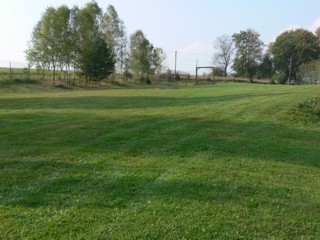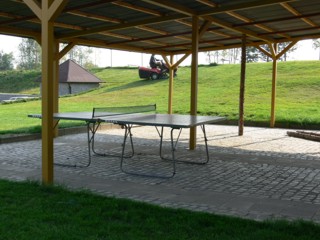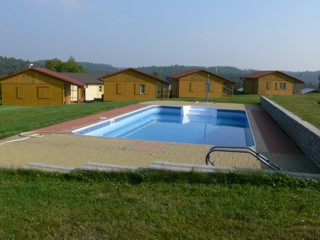Leisure Time
Sports
On site, these include a volleyball court, basketball, five a side football pitch, modern open-air swimming pool, a large playground swing, table tennis, table football and pool tables. Small rooms are available for meetings and the Dining Room may be used for larger functions.
Swimming Pool
Situated inside the Camp this pool is a state-of-the-art facility incorporating the very latest filtration and sterilisation systems.
The Surrounding Area
The area around the Camp is excellent walking country.
Vlčí hora
J. W. Goethe, the great German poet, frequented the nearby Vlčí hora (Wolf Mountain, elevation 704 m) and it is said he was inspired by the magnificent view from this mountain. He also collected the very unusual minerals found on its slopes.
Třebel
This village, 6 km walk from the Camp, is the site of a castle built in the first half of the 13th century by knights from Třebel. In the 15th century the Wolfstein family made the village their home. From 1495 to 1659 the Švamberk owned the village. During the Thirty Years War the castle was badly damaged, its ruins are still visible.
Michalovy hory
This village, 8 km walk from the Camp, was founded as a mining settlement, in the 15th century around the Chapel of the Archangel Michael. In 1506 King Vlladislav Jagelonský granted the miners a permit to mine silver. By the end of the 16th century during the rule of the Šlik family from Planá, mining had undergone rapid development and most of the silver mined was transported to the local mint in Planá. In the 19th century silver mining in the area declined in importance and limestone quarrying began to develop. Papermaking became an important industry at this time. In 1853 the village was granted “town” status and the present population of 80 persons make it the second smallest town in the Czech Republic.
Kosí potok
There is some excellent walking along the Kosí Potok, which is regarded as one of the most picturesque areas in the Czech Republic. Footpaths in the Czech Republic are very well marked and many signs give good background information for walkers.



